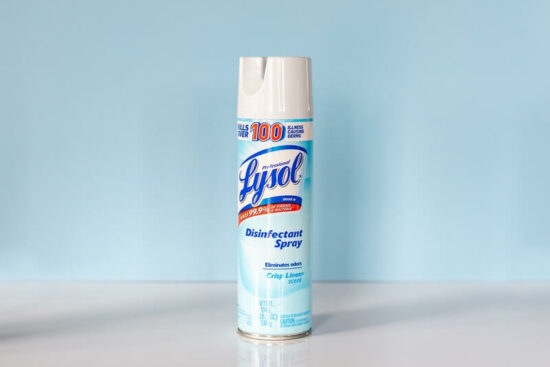There are some questions we receive far more than others, and “Does Lysol kill bed bugs?” is near the top of the list.
And when you think about it, that makes perfect sense.
Lysol is something that pretty much everyone has in their home, and it does a fantastic job of dealing with all sorts of nasty germs.
But will Lysol kill bed bugs? This guide will cover everything you need to know.
Table of Contents
What Is In Lysol Spray?
Lysol is one of the most popular cleaning products in the world. The original Lysol product came out over 130 years ago. But despite its age, it’s still widely used. Turn on your TV, and you’ll still see a commercial for it at some point!
So what makes Lysol so great? For most people, the product’s biggest draw is more than its cleaning power. It’s the sanitization.
Lysol is a disinfectant, and most modern formulas on store shelves have that iconic “Kills 99.9 percent of bacteria and viruses” banner. It’s about more than simply masking an odor or picking up gunk. Lysol can truly clean surfaces, making them safe to touch.
In most Lysol products, lactic acid, isopropyl alcohol, and hydrogen peroxide are the magic active ingredient that kills germs. Those are the most common ingredients in standard Lysol sprays and wipes.
That said, there are many Lysol products on the market today. Some utilize ingredients like ethanol and alkyl dimethyl benzyl ammonium saccharinate. The latter is a biocide commonly used in aerosol disinfectants because of its sanitizing power.
No matter the formula, you can expect alcohol and hydrogen peroxide. Both of those ingredients are powerful disinfectants, giving Lysol its trademark efficiency.
Does Lysol Kill Bed Bugs?
It’s not hard to see why people would want to know if Lysol kills bed bugs. Bed bugs are difficult-to-see insects that prey on your body at night. Many view them in the same category as bacteria and viruses. While bed bugs are not the same as bacteria, the comparison makes sense.
Unfortunately, Lysol isn’t as effective against bed bugs as some assume.
Theoretically, Lysol can occasionally kill bed bugs. But doing so requires more than a light spritz. To kill bed bugs, you’d have to douse the insects in the disinfectant.
- Kill bed bugs and bed bug eggs
- Use spray as a spot treatment around bed frames, mattress seams/tufts/folds, and baseboards
- Kills even the toughest bed bugs
- The continuous spray Comfort Wand easily gets into hard-to-reach areas
That’s not a realistic or practical route to take if you have an infestation.
The Lysol disinfectant spray that you use to wipe down your countertops isn’t enough to kill these pests. That’s not just hearsay, either. Legitimate studies have tested the theory.
The disinfectants sometimes cause bed bugs to slow down and pause its reproductive cycle. However, the effects are temporary at best, and the results didn’t occur throughout the study. Therefore, that aspect was a non-starter, and the primary hypothesis wasn’t any better. There’s no proof that Lysol will kill bed bugs.
Ask anyone who’s tried, and they’ll likely tell you the same.
Why It’s Not The Ideal Method
There are a few reasons why Lysol is ineffective when it comes to killing bed bugs. First, getting the active ingredients onto the critters is a difficult task. It seems easy enough, given the easy dispersion achieved by an aerosol can.
But bed bugs go into hiding very quickly. They flee the moment you turn on the lights. By the time you’re able to spray the disinfectant, most bugs are already onto their next hiding space.
Another issue is that bed bugs have exoskeletons. They might be small, but they’re bugs nonetheless. That means they have exoskeletons they shed.
That tough outer shell is pretty resilient. While the alcohol and hydrogen peroxide in Lysol is tough enough to kill bacteria and viruses, they won’t penetrate the bug’s exoskeleton.
Again, you might see some results if you douse the critters. But death is usually a result of drowning and has nothing to do with the actual chemicals in Lysol.
But what about the eggs?
Unfortunately, Lysol is even less effective on bed bug eggs. The active ingredients in disinfectant spray aren’t strong enough to penetrate the hard surface of a bed bug egg.
Ways To Incorporate Lysol Into Your Bed Bug Removal Strategy
Lysol doesn’t kill bed bugs, and most experts don’t recommend that you try to use the product for that purpose.
But that doesn’t mean you can’t utilize Lysol at all if you have a bed bug problem. The disinfectant is an excellent product to have around your home. For many people, it provides peace of mind.
- Kill bed bugs and bed bug eggs
- Use spray as a spot treatment around bed frames, mattress seams/tufts/folds, and baseboards
- Kills even the toughest bed bugs
- The continuous spray Comfort Wand easily gets into hard-to-reach areas
You can’t see the bacteria and viruses Lysol kills with your naked eye. However, you can feel the cleanliness, and many people like the reassurance that there are no invisible germs around to make them sick. If you fall into that same way of thinking, feel free to use it!
There’s no harm in adding Lysol into your bed bug treatment strategies. However, it’s best to leave the actual killing to other products.
The best way to incorporate Lysol into your bed bug extermination plan is for general cleanup. Contrary to popular belief, these pests aren’t always attracted to dirt and grime. Just because you have a filthy room doesn’t mean you have bed bugs and vice versa.
That said, it pays to keep things clean! With a clean room, these blood-suckers have fewer places to hide. When dealing with a bed bug infestation, it’s always a good idea to tidy things up and remove as much clutter as possible.
Don’t hesitate to use Lysol during the general cleanup phase. It won’t sabotage your other efforts and will help you create a healthier space.
Another way you can incorporate Lysol into your treatment plan is after you get rid of the bed bugs. Lysol can come in handy as you vacuum up dead bugs and discard a once-thriving bed bug population. The disinfectant can sanitize everything for that added peace of mind.
Effective Alternatives
If you’re frustrated that Lysol doesn’t kill bed bugs, fear not! There are many great products and treatment methods that will get the job done.
Your best bet is to use proper bed bug pesticide. These products contain chemicals that could put your family at risk. But if you take the proper precautions, it’ll take care of your bed bug problem in no time!
There’s no shortage of sprays and solutions to try. Head to your local home improvement store, and you’ll likely find a few.
More natural solutions are available, too. You might find some that use desiccants like Diatomaceous Earth or biochemical solutions like neem oil. They have varying degrees of efficiency, but they might be worth a shot if you don’t want chemicals.
Of course, you can also turn to a professional. Pest control experts use potent products. They also know how to tackle the issue while mitigating the risks.
Safety Considerations When Using It
Lysol is such an indispensable part of modern living that most people don’t think twice about using it. But disinfectant products like this can be dangerous if misused. It is, after all, full of alcohol and chemicals.
So, what are the risks?
If you’re using Lysol to help with the cleanup after killing bed bugs, the most immediate danger is getting the spray in your eyes. The alcohol can cause instant irritation, resulting in a debilitating burn that you don’t want to deal with. Unfortunately, these injuries are pretty common!
Lysol is most commonly used in its aerosol form. Once sprayed, the solution goes airborne. If you have a fan or a super powerful air conditioner, it can easily blow back into your face. Always exercise caution when choosing where to spray Lysol.
Another issue is the fumes. The alcohol in Lysol can seriously harm your health if inhaled or ingested. Once again, that risk occurs when you improperly spray the product (and it’s easy to do when
If you’re not in a well-ventilated area, inhaling the disinfectant is easier than you think. When that happens, you can be in serious trouble.
Lysol is capable of affecting your central nervous system. You might experience extreme headaches, dizziness, and worse. Plus, there’s the issue of irritation.
When you inhale Lysol, it can coat your throat and lungs, causing a painful burn.
Lysol will cause stomach pain, nausea, vomiting, and more in cases of ingestion.
The disinfectant can be dangerous even if you don’t get it into your system. It often causes skin irritation if sprayed onto your arms or hands. There’s also the risk of explosion and fire.
Cans of Lysol are heavily pressurized. A small puncture can cause the bottle to explode. You’re looking at a possible fire hazard if a spark is involved.
Remember: Lysol is predominantly alcohol. Never use it around fires or if you’re smoking.
As a whole, Lysol is pretty dangerous stuff if you don’t use it carefully. So many people spray this disinfectant liberally around their homes. But going overboard can be risky.
That’s why you should never try to use Lysol to kill bed bugs. While you might see success dousing the pests in the disinfectant, the risks outweigh the benefits.
That’s especially true if you have kids and pets in the home. Kids and pets are more vulnerable to the ill effects of Lysol, and the fumes can linger for longer than you think.
Lysol is perfectly safe when used according to the directions. It’s not very concentrated when you spray it normally. Problems occur when you try to soak surfaces or kill bugs with the solution.
Disinfectants aren’t supposed to be utilized in high concentrations, so it’s better to save your Lysol for wiping down counters and surfaces.
Conclusion
While it’s quite natural to wonder if Lysol kills bed bugs or not, using this strategy will ultimately fail. However, incorporating it into your cleanup strategy after treatment is a great idea!
If you have any other Lysol-related strategies for bed bugs that you’d like to discuss, send us a message. We love hearing what the DIY community is up to!



